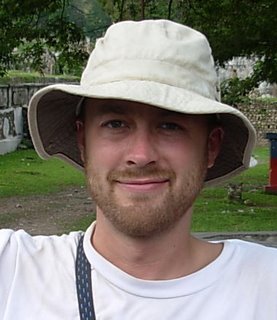Now that I've been so lazy in posting things here that there's only one person even checking it anymore (yes, mom, that would be you), I'm determined to get back on the ball. At the very least, I should point you to the blogs of two new couples who are on the team, who are still relatively new to Haiti and taking it all in. The first is of the Thompsonowaks, Sharon and Bryan, who are from Philadelphia, and now live in Dezam where they work on the reforestation and environmental education programs. The second is Ben and Alexis Depp, who live here in Port-au-Prince. She works at a Haitian human rights organization like me, and he is a photographer for a microfinance organization called Fonkoze.
I know it's normal for people in my situation to spend a lot of time thinking, and communicating with people back home, about the new, exotic place where they find themselves living. But as the months wear on, the mind is less boggled and the senses are less saturated. Crossing the street no longer makes the heart race.
But Haiti is an unending feast of observations. There's no shortage of things to write about. And really, I'm often just as amazed and baffled by this place as I was when I first arrived. In addition, I've just moved into a new place. It's a fresh, new experience. I'll post photos or a video soon. It's an apartment on the fifth and top floor of a large, concrete building. From down the street, the building looks just so slightly off. The up-down lines don't quite run parallel. The floor plan of my apartment would resemble a slice of pizza, with the shower tucked into the tip, followed by the kitchen, living/dining room, bedroom, and finally the terrace as crust. It's got access to a walled-off section of the roof, also shaped like a wedge, where I dry my clothes. And there's a nearly steady breeze which keeps it nice and cool.
The most interesting part, for me, has been living without an inverter and batteries. The state power grid generally gives about six hours of electricity every 24 hour period. People of means usually have an inverter system, which charges 4-8 car-size batteries during those six hours, and then provides energy, hopefully, for the rest of the time. When you're using a system like this, florescent lights and energy-conscious habits are not a proud badge of environmental stewardship as much as they are a very practical strategy for keeping the lights on. Living like that was interesting for those 18 months in my first apartment. But now, I'm trying something new. I'm seeing how the other half lives, even if only in a limited capacity. After all, most people in this city can't keep typing on their laptops that have their own built-in battery, connected to someone else's wireless internet that is itself connected to an inverter, as I am doing right now. But it is an interesting exercise in appreciating randomness, because you never really know when the power is going to come on. Or if it's going to come on at all. Sometimes a good 48 hours will pass with no power at all. And when it does come on, you can hear a collective shout of joy from the surrounding houses. Now I'm one of those happy shouters. The state power company is called EDH, for Electricité d'Haiti, and their logo is a big lightning bolt over a gear. Fitting, I think, because the role EDH plays is much like that of Zeus - lounging on his cloud, lightning in hand, arbitrarily deciding when to strike. The difference, I guess, being that people look forward to the lightning that EDH sends. Today, it was already on at 6:30 when I got home, which is much earlier than usual. I think it was because there was a big soccer game on. And I have noticed that customarily in the week before Christmas there will be very little electricity each day, but then it comes nonstop for a solid 24 hours at least. The gods of EDH are apparently not without sentimentality.
Wednesday, November 19, 2008
Subscribe to:
Comments (Atom)
